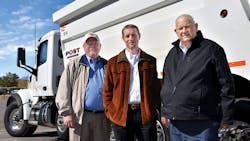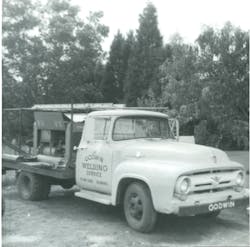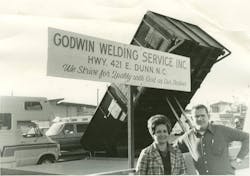Not long after the passing of James Patrick “Pat” Godwin Sr., 82, late last fall, The Godwin Group posted a note on its LinkedIn page to thank everyone who had reached out with kind words and prayers. But, as the founder of what would become the country’s largest family-owned truck body manufacturer often said, it was time to “Get back to work!”
Pat died Nov. 21, three weeks after a fall at home.
And, as family members explained to Trailer/Body Builders, a commitment to hard work was the defining characteristic of Pat’s success.
That work began on the family sweet potato farm in Sampson Country, North Carolina, where Pat became a “jack of all trades” before landing an early job as a route driver for the area’s Pepsi-Cola bottler, delivering sodas to rural farm stores.
Pat’s son and The Godwin Group President Patrick Godwin Jr., known as “Junior” throughout the industry, recalled that his father became the top driver by keeping the same early farmers’ hours to better serve customers on his route. But rather than calling it a day and heading home at noon when he’d made his deliveries, Pat would head to the bottling plant’s shop where the trucks were maintained and repaired.
Turned out, he enjoyed being around machinery and fabrication work. A business that would become a multi-brand corporate powerhouse known for customer focus and innovation got its start when Pat—not yet 25—launched Godwin Welding Service in his backyard, unplugging the stove to plug in his welder.
Speaking from her father’s office, daughter and Corporate Vice President Phyllis Godwin Strickland confirmed that Pat, who left school after sixth grade, very much believed the words posted there: “I am not smart enough to know that I can’t do it.”
“I think he also realized that he had an exceptional concept of math,” Phyllis said. “He could basically calculate in his head, and he understood geometry and how things work. He always said that he was blessed with good common sense.”
Junior confirmed that the slogan wasn’t all false modesty.
“As funny as the sign in his office is, there may be some truth to that,” he said. “He didn’t let his own faults get in his way; he tackled things head-on without fear. He never used reverse gear very much.”
Unconventional
Much of Pat’s success stemmed from his not being restricted by the need to do something in a certain way because that’s how everyone else did it.
As Junior explained, 20 or 30 years ago the company had a contract with a state department of transportation that called for a performance bond. Pat saw such an insurance policy, basically, as giving away a piece of his profit for a job well done. And he didn’t want to do that. His unorthodox solution led to a lot of bureaucratic head scratching at the DOT.
“We sent them a check for what the contract was worth, what we bid on the contract,” Junior said. “And that was a big amount of money. At the end of the contract, they sent us the money back.”
Recognized more in his work shirts and suspenders, rather than suit and tie, Pat didn’t mind being underestimated—and even played up his simple, farm-boy roots, as Patrick Godwin III, company CMO, added. He recalled the time “a massive investment company” came courting, wanting to buy the business.
Read more: The last face of a family business
They dispatched a private jet, and investment bankers met him at the airport in a Rolls-Royce limousine. On the way into town, they asked Pat where he’d like to go for dinner.
“He pointed to a restaurant and said let’s go eat there—and the people in the car were shocked. It ended up being a Kentucky Fried Chicken,” Patrick said. “That really exemplifies who he was: He wasn’t impressed by things like jets and limos. He was impressed by your work ethic, by what you did for the public and what you did for people.”
Similarly, Junior recalled that his father liked to visit competitors anonymously. Once, the owner of a competing business shared an unflattering assessment of Godwin products.
“Needless to say, that was not a very good discussion at all. And they had no idea who they were talking to,” Junior said. “He decided at that point that he just needed to bow out of that conversation and leave fairly quickly before they figured out who he was.”
And, on a couple of occasions, Pat and a competitor might have gotten a little sideways on a deal.
“They’d coming knocking on the door, wanting us to sell [the business] to them,” Junior said. “This is exactly what he told them: ‘One of these days we’re going to own you,’ and, by golly, we did.”
Still and after all, as Phyllis pointed out, competitors can also become friends—especially in an industry like truck bodies.
“Everybody’s in this business to make money. Get to know your competitors and get to know their products. But don’t talk down about your competitors,” she said. “That would reflect badly on our character if we did.
“It’s amazing when we go to a trade show, especially The Work Truck Show, how many vendors, competitors, and people in general would seek Pat out to say hello. Leaders of some our biggest competitors would reach out to him to have a hot dog and a conversation.”
Potential and expectations
His children didn’t shy away from recalling that Pat’s parenting style was based on “tough love.”
“When we were at work, we always addressed him as ‘Pat,’” Phyllis said. “There was a distinct difference between being at work and being at home. We all grew up knowing what was expected. Fortunately, we had a very doting mother that really picked up the slack. Were we the perfect children? No. Was he the perfect father? No. We were loved, but he spent a lot of our childhood hours at work.”
Indeed, Patrick characterized his grandfather as “addicted to work.”
“He was one of the first ones in and was the last one to leave. He was always into something; he had his hand in all parts of the business, just about to the end,” Patrick said. “He was really demanding, and he could be extremely difficult to work with. But that was his way of teaching.
“He was hard on you because he could always see your potential. He did the same thing with his employees. Work ethic was at the top of his expectations. However, where much was expected, he also rewarded these employees. If you worked to your expectations and you had a strong work ethic, you’re going to be well compensated.”
Ultimately, if Pat surprised anyone it was because they made the wrong assumptions.
“The easiest way I can summarize all these stories, all these descriptions, is to look at him on the street,” Junior said. “He was who he was, and you wouldn’t think he had two nickels to rub together. And he wanted you to think that.
“He didn’t want you to know who he was, because that’s how he found out about himself.”
Pat-isms
Chances are good that anyone who sat in on a meeting with Pat Godwin would hear one or more of what The Godwin Group employees fondly refer to as Pat-isms. A selection:
- I’m not smart enough to know I can’t do it
- I don’t need it now, just before you wake up tomorrow
- Listen here, chief (you know you’re in trouble with this one)
- Juice ain’t worth the squeeze
- I’m not asleep, I’m meditating (as he appears asleep in meetings)
- It ain’t braggin’ if you’re tellin’ the truth
- It’s a bad wind that can’t change
- You get what you pay for
- I didn’t say it was your fault, but you’re getting the blame for it
- A wise man will change his mind, a fool never does
- Before me there wasn’t me, and after me there won’t be
- If I get to hell and you’re not there, I know the last bus ain’t run yet (to someone who’s done him wrong)
- Let me be very pacific
- If you need me, I’ll call you (usually results in confused looks)
- Once you say “I can’t” you’re half defeated


